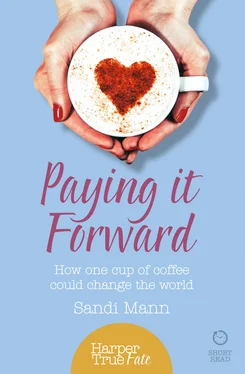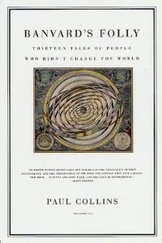Researchers Novak and Roch, who coined the term ‘upstream reciprocity’, also suggested that paying it forward had evolutionary advantages, in that it encourages the exchange of resources within a group. Groups with altruists in them would be more altruistic as a whole, because kindness is so contagious (see below), making them more likely to survive than selfish groups. Interestingly, in his book on evolution, The Descent of Man , Charles Darwin mentions ‘the survival of the fittest’ (the concept he is perhaps best known for) only twice, whereas benevolence gets a whopping 99 mentions.
The concept of paying it forward also goes by other names, particularly ‘random acts of kindness’ (RAK). The origins of this term are unclear. One source claims it was coined by a Dr Chuck Wall in 1994 in response to a news article that reported on what it called yet another ‘random act of senseless violence’. Another source, however, credits the term to an Anne Herbert who in a California restaurant in 1982 scrawled the words ‘Practise random acts of kindness and senseless acts of beauty’ on a place mat – something that was photographed and copied until it became part of legend.
How PIF works
Paying it forward works because kindness is contagious. Research conducted by James Fowler and Nicholas Christakis, who are co-authors of the book Connected: The Surprising Power of Our Social Networks and How They Shape Our Lives , shows that when one person gives money to help others in a ‘public-goods game’ (which psychologists often use to investigate what happens when people are given the opportunity to cooperate with each other), the recipients are more likely to give their own money away to other people in future games. This creates a domino effect in which one person’s generosity spreads forward so that they can indirectly bring about acts of kindness to tens (or more) of people. And, of course, each of those people creates their own domino effect when they pay it forward in turn. We return to this idea in later chapters of this book.
Chapter 2
Why Giving Feels Good
Are you nice? Kind? Caring? Of course you are – most of us like to think of ourselves as nice, caring, kind individuals. Doing something nice for other people strengthens our perception of ourselves as someone nice and caring and makes us feel good. This is why they say it is better to give than to receive; giving enhances our self-identity, whereas receiving can lower it by making us feel indebted and perhaps even weak and incompetent.
We think we are kinder than everyone else
In a 2014 survey, 46 per cent of respondents said they considered themselves to be very kind, rating themselves 5/5 for kindness. A further 40 per cent rated themselves at 4/5, and only 14 per cent admitted to not being very kind at all, with self-ratings of 3 or less out of 5.
However, the same people rated other people as being far less kind. Just 16 per cent of people said they considered the people around them to be very kind (5/5), while 34 per cent gave the people around them a 4/5 rating and the rest (51 per cent) 3 or less.
This idea was tested in 2014 using Karma Kitchen, a pay-it-forward Indian restaurant. At the end of their meal, customers were told (as is usual at Karma Kitchen) that their meal had been paid for by someone else. They were then invited to pay it forward by paying for another customer’s meal. However, what differed from usual was that in the experiment half the customers were given a PIF message that stressed the giving part of the transaction, while the other half were given a message that stressed the receiving part. People chose to pay more for the next customer when the giving part was emphasised (the average donation being $20.42) than when the receiving part was stressed ($11.09). This shows that, for most of us, giving really is more motivating than getting.
Perhaps this is because we reap so many benefits from being kind, as the next sections suggest.
Kind people are happier
A Japanese study in 2006 showed that kind people experience more happiness and have happier memories than less kind people. The research showed that simply noting and counting acts of kindness for a week can make us happier. This could be because being kind makes us value ourselves as good people and therefore makes us feel more positive – by counting our acts of kindness in a week, we are reminding ourselves of how nice we are and consequently enhancing our own self-esteem. Even the thought of helping others makes us happier, and there are physiological reasons for this. Brain scans have shown that just thinking about helping others activates the mesolimbic pathway in the brain, which produces the feel-good chemical dopamine.
Performing acts of kindness has consistently been shown to relate to being more satisfied with life. If you were to perform five kind acts every week, after six weeks you would most likely feel happier than if you had not performed these acts (try it!). This could be because, as suggested above, being nice makes us feel better about ourselves, but there could be another explanation for why being kind makes us happier. A paper in 2010 published in the esteemed Journal of Social Psychology argues that being kind makes us happier because of the novelty factor. Humans crave new stimuli, and people who perform acts of kindness every so often thus experience the ‘thrill’ of the novelty of it. So, for example, imagine that you and a friend decide to take me up on my ‘five acts of kindness per week’ challenge. Your friend decides to get all their kind acts over with in one day each week, while you prefer to spread them across the week. Who will be happier? Research suggests that your friend will. This is because they will get a buzz from the novelty of being kind one day a week, whereas for you the novelty of being nice will quickly wear off with your more regular acts of kindness.
Kind people are more accepting of others
A study at the University of British Columbia in Vancouver, Canada, was designed to see what would happen when 9–11-year-old children performed acts of kindness for four weeks. As expected, those who performed the kind deeds ended up feeling happier than those who didn’t. But what was really interesting was that these kids were also more accepting and tolerant of their peers. Being kind, then, seems to make us nicer people. Perhaps this works via a self-fulfilling prophecy, whereby we notice that we have done something nice and thus conclude that we must be a good person – and good people are accepting and tolerant of others.
Being kind can even help our health
Cami Walker, a multiple sclerosis sufferer from Los Angeles, decided to perform an act of kindness every day for a month – and was startled by the results (documented in her book 29 Gifts: How a Month of Giving Can Change Your Life ). She found that being kind helped her cope with her MS better and use less pain medication. She also become more mobile. She had fewer flare-ups, and scans even showed that the disease had slowed its progression. She later set up a RAK organisation, 29gifts.org.
Ms Walker’s experience is not a scientific study, of course – but science does seem to back up her findings. In a 2002 study published in Pain Management Nursing , researchers found that patients with chronic pain experienced less pain, depression and disability when they counselled and helped other patients. Helping others could be so beneficial to our health that it might even save our lives. In another study, this time at the Buck Institute for Age Research in California, elderly volunteers who helped out for more than four hours per week were 44 per cent less likely to die during the course of the study than those who didn’t. And a study that followed 427 married women over a period of 30 years found that 52 per cent of those who did not volunteer experienced a major illness – compared with only 36 per cent who did volunteer.
Читать дальше











